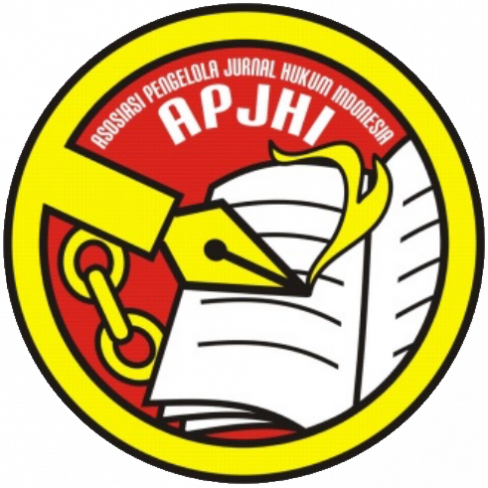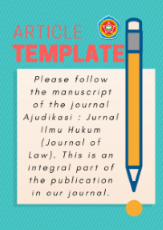Analysis of Revitalization Practices for Division of Heritage and Implications in Muslim Society
DOI:
https://doi.org/10.30656/ajudikasi.v8i1.8972Keywords:
Inheritance Division Revitalization Practices;, Inherited Division ImplicationsAbstract
This can raise a variety of practical problems, especially in terms of the fulfillment of the daily needs of heirs who may be controlled by the long-standing process of inheritance division that the Investigator will investigate the practice of rejuvenation of the division of the Muslim community, and how the implications of this research use normative law research, with the pointing of the law as the building of the norm system, thus the data used is secondary data referring to a set of data, including qualitatively analyzed library studies and documentation, the use of the will to regulate the partition of the heritage into an emerging trend, the implementation of accelerated partition practices in Muslim communities has a significant positive impact, the distribution of the legacy fairly and quickly, minimizing potential conflicts and conflicts in the family, strengthening social bonds and family bonds in the entire Muslim community barbarslot. There are still obstacles and challenges to be overcome in implementing these practices widely and collaborative efforts are needed to address these issues so that accelerating the division of heritage can become a sustainable norm within the Muslim community.
Downloads
References
Amrin, A. (2022). Tinjauan Hukum Islam Terhadap Hukum Waris Beda Agama. Syar’ie : Jurnal Pemikiran Ekonomi Islam, 5(2), 146–155. https://doi.org/10.51476/syarie.v5i2.377
Arif, M. R. (2017). Pemberian Wasiat Wajibah Terhadap AhliWasiat Beda Agama (Kajian Perbandingan Hukum Antara Hukum Islam dan Putusan Mahkamah Agung Nomor 368.K/AG/1995). DE LEGA LATA: Jurnal Ilmu Hukum, 2(2), 351–372.
Fauzi, M. Y. (2019). Pembagian Harta Dengan Wasiat Wajibah Dan Hibah Dalam Hukum Islam. Asas: Jurnal Hukum Ekonomi Syari’ah, 9(1), 103–110.
Geertz, C. (1976). The Religion of Java. University of Chicago Press. http://books.google.ie/books?id=-SYM4PW-YAgC&printsec=frontcover&dq=Warisan+adalah+segala+sesuatu+yang+ditinggalkan+oleh+nenek+moyang+atau+orang orang+terdahulu+yang+memiliki+nilai+sejarah,+budaya,+atau+materi+yang+penting&hl=&cd=1&source=gbs_api
Harnides, Abbas, S., & Khairuddin. (2023). Gender Justice in Inheritance Distribution Practices in South Aceh, Indonesia. Samarah, 7(2), 1293–1316. https://doi.org/10.22373/sjhk.v7i2.16688
Herawati, A. (2020). Urgensi penyegeraan pelaksanaan warisan. 6, 183–191.
Kusuma, N. (2022). Peran notaris dalam pembuatan akta wasiat tentang pembagian harta waris menurut hukum islam.
Mahsus, M. (2020). Contextual Interpretation and the Existence of Women and Their Implications for Equalization of the Inheritance of Men and Women. Journal of Islamic Law, 1(1), 25–44. https://doi.org/10.24260/jil.v1i1.19
Mufid, A. (2020). Rekonstruksi Hukum Warisan Di Indonesia Perspektif Pluralisme Agama. Al-Qadha, 7(1), 60–72. https://doi.org/10.32505/qadha.v7i1.1531
Muhamad Khasim, A. F. R. (2023). Implementasi Pembagian Waris Adat Masyarakat Desa Puspo Bruno Purworejo. Jurnal Hukum, 2(1), 27–42. https://jurnal.umpwr.ac.id/index.php/eksaminasi/article/view/2630/1443
Nafis, M. (2022). Praktik Pembagian Harta Waris Di Lingkungan Keluarga Kiai Pondok Pesantren (Studi Kasus Di Pesantren Kecamatan Lasem). http://repository.unissula.ac.id/27623/%0Ahttp://repository.unissula.ac.id/27623/1/30501800055_fullpdf.pdf
Pahmiyanti, K. N. (2022). Disparitas Putusan Pembagian Harta Waris Laki-Laki dan Perempuan Perspektif Keadilan Berimbang dan Maqâṣid al-Syarî’ah. Repository.Uinjkt.Ac.Id. https://repository.uinjkt.ac.id/dspace/handle/123456789/67291
Putra, P. G. P., Kurniansah, R., Budiatiningsih, M., Istianingsih, N., Darma Susila, I. M. G., Suteja, I. W., M, A., G Yudawisastra, H., & Darsana, I. M. (2024). warisan budaya sebagai kekayaan pariwisata. CV. Intelektual Manifes. https://books.google.ie/books?id=3urwEAAAQBAJ&pg=PA7&dq=Warisan+dapat+berupa+benda+benda+bersejarah,+tradisi,+pengetahuan,+atau+keterampilan+yang+diwariskan+dari+generasi+ke+generasi&hl=&cd=1&source=gbs_api#v=onepage&q=Warisan dapat berupa benda benda bersejarah%2C tradisi%2C pengetahuan%2C atau keterampilan yang diwariskan dari generasi ke generasi&f=false
Rais, M., Pengadilan, H., Sintang, A., & Barat, K. (2016). Kedudukan Anak Angkat Dalam Perspektif Hukum Islam, Hukum Adat Dan Hukum Perdata (Analisis Komparatif). Jurnal Hukum Diktum, 183(2), 183–200.
Raja Ritonga. (2020). Sistem Kewarisan Adat Masyarakat Muslim Suku Tengger Perspektif Hukum Islam. El-Ahli : Jurnal Hukum Keluarga Islam, 1(1), 1–19. https://doi.org/10.56874/el-ahli.v1i1.111
Sriani, E. (2018). Fiqih Mawaris Kontemporer: Pembagian Waris Berkeadilan Gender. TAWAZUN : Journal of Sharia Economic Law, 1(2), 133. https://doi.org/10.21043/tawazun.v1i2.4986
Syaifullah, M., Manangin, A., Nurmala, L. D., & Martam, N. K. (2020). Pengalihan atas Harta. Ilmu Hukum, 16(2), 177–189.
Utami, I. (2020). the Role of Women in the Family Against the Distribution of Inheritance in the City of Palembang. Nurani: Jurnal Kajian Syari’ah Dan Masyarakat, 20(1), 37–48. https://doi.org/10.19109/nurani.v20i1.4366
Widiatmoko, K., Bilalu, N., & Lamaluta, F. (2023). Pewarisan Tradisional dalam Masyarakat Muslim: Analisis Hukum Adat Suku Tengger dari Perspektif Islam. Al-Mujtahid: Journal of Islamic Family Law, 3(2), 92. https://doi.org/10.30984/ajifl.v3i2.1960
Downloads
Published
Issue
Section
License
Copyright (c) 2024 Ajudikasi : Jurnal Ilmu Hukum

This work is licensed under a Creative Commons Attribution-ShareAlike 4.0 International License.
Authors who publish with this journal agree to the following terms:
Authors retain copyright and grant the journal right of first publication with the work simultaneously licensed under a Creative Commons Attribution License that allows others to share the work with an acknowledgment of the work's authorship and initial publication in this journal.
Authors can enter into separate, additional contractual arrangements for the non-exclusive distribution of the journal's published version of the work (e.g., post it to an institutional repository or publish it in a book) with an acknowledgment of its initial publication in this journal.
Authors are permitted and encouraged to post their work online (e.g., in institutional repositories or on their website) before and during the submission process, as it can lead to productive exchanges and earlier and greater citation of published work.
All articles in Ajudikasi : Jurnal Ilmu Hukum can be disseminated provided they include the identity of the article and the source of the article (Ajudikasi : Jurnal Ilmu Hukum). The publisher is not responsible for the contents of the article. The content of the article is the sole responsibility of the author
Ajudikasi : Jurnal Ilmu Hukum is lincensed under a Creative Commons Attribution-ShareAlike 4.0 International License.









1.png)
.png)
.png)





.png)
.png)
.png)
.png)





.png)







